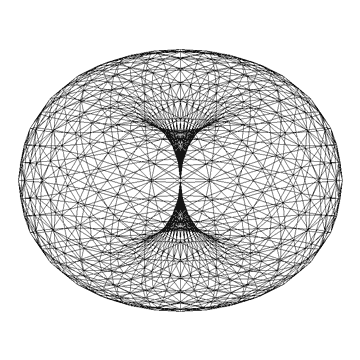When you "know everything", you "fix" your reality more firmly into place to meet those expectations; this then tends to shove other possibilities aside. Now most persons' natural reaction to this statement is "Oh, I'll be the first to tell you I don't know everything. There's lots of things I don't know." Well, this perhaps is true, or at least difficult to deny. However that type of knowing is not precisely the center of our statement. Here is perhaps another instance where the western english is falling short conceptually, much in the way some languages cannot be translated literally into others. But the knowing at subject here acts as more of an assurance we have gained as we grow and experience life, i.e. knowing the sun will rise tomorrow at a certain time and place.
Most folks tend to (subconsciously) choose demarcation points of the people and things as observed and perceived around themselves, which is an essential part of the act of defining and learning. Most try hard to relate and "make sense" and will process the evidence observed in such a way as to support what is already "known" to be consistent. This process is integrated as to shape their internal map of that perceived as outside of themselves . These definitions of not only objects, but behaviors, interpretations, and general limits of any consistent person, place or thing demarcate our personal DMZ. Depending on your level of awareness towards your own inner faculties, you may have a good idea of how deep these tendencies can burrow into our way of thinking and perceiving.
EDIT: I may have that backwards, as this structure seems to be more dendritic, or "tree-like". Each truly new concept you learn creates a node against your background (mental?) vibration. This then acts to seed a new branch of your knowledge.
Ah! to take the metaphor to it's extant: The seed of a new idea both grows into your future as new knowledge (and consequently may adjust actions and perceptions), as well as grows roots into how you view what happened in your past. "Hindsight is 20/20" may be referencing from the roots of ideas learned after-the-fact.
I suppose what I am trying to say is, if you take "You tend to find what you are looking for." to the Nth degree, then you can start to realize how far into your own perceptions that your expectations are shaping what you call "Real". Having said that, there certainly appears to be a consistent phenomena that all humans (at least currently) perceive as "out there", as viewed from inside each of our own skulls.
If you want a snappy answer to a stupid question, try "That's because I'm in here, and you're out there...." You may be surprised to find how many chances you get to use that!
At this point you may be saying "You're talking about being open minded. I consider myself fairly open minded." I beleive most persons think they are, but then they will turn around and make a disparaging comment. Most negative comments and perceptions about the world around us arise from our own perceived shortcomings.
Here is an excellent example of being open minded, presented in the form of an ancient eastern parable:
A farmer and his son had a beloved stallion who helped the family earn a living. One day, the horse ran away and their neighbors exclaimed, “Your horse ran away, what terrible luck!” The farmer replied, “Maybe so, maybe not. We’ll see.”
A few days later, the horse returned home, leading a few wild mares back to the farm as well. The neighbors shouted out, “Your horse has returned, and brought several horses home with him. What great luck!” The farmer replied, “Maybe so, maybe not. We’ll see.”
Later that week, the farmer’s son was trying to break one of the mares and she threw him to the ground, breaking his leg. The villagers cried, “Your son broke his leg, what terrible luck!” The farmer replied, “Maybe so, maybe not. We’ll see.”
A few weeks later, soldiers from the national army marched through town, recruiting all the able-bodied boys for the army. They did not take the farmer’s son, still recovering from his injury. Friends shouted, “Your boy is spared, what tremendous luck!” To which the farmer replied, “Maybe so, maybe not. We’ll see.”
It is this type of attitude that is condusive towards allowing yourself to operate in harmony with your surroundings. Your reaction to what happens around you is pivotal towards how you get along with yourself and others (and with things as well!)
If we consider that what surrounds us is a living thing, and that it responds to us much in the same way as a loving parent or pet, then it's easy to see that how it behaves is largely up to how we treat it and ourself.
Let Love be your Guide

Last edited by Threecaster on Thu Jul 12, 2012 7:57 am; edited 1 time in total














 whew! how about) euphoric discoveries lying in wait.
whew! how about) euphoric discoveries lying in wait.
 ; we are twin souls and truly are two sides of the same coin)
; we are twin souls and truly are two sides of the same coin)


 AWESOME!
AWESOME! ) (Sorry!)
) (Sorry!) 
 . Anyways, the last chapter gave a very good overview (though I don't know how I would know what a bad overview is) of quantum mechanics. What intrigued me most was strong evidence saying our universe is non-local, that is to say, everything effects everything. The other thing I liked was the explanation of the quantum zeno effect which says that when we focus on a molecule or atom in a certain state and ask if it has changed states, it does so less frequently than if we didn't ask it (the Watched Pot effect)
. Anyways, the last chapter gave a very good overview (though I don't know how I would know what a bad overview is) of quantum mechanics. What intrigued me most was strong evidence saying our universe is non-local, that is to say, everything effects everything. The other thing I liked was the explanation of the quantum zeno effect which says that when we focus on a molecule or atom in a certain state and ask if it has changed states, it does so less frequently than if we didn't ask it (the Watched Pot effect) . Learning how beliefs influence reality is necessary for there to be a strong cultural awakening, still contradictory to mainstream scientific thought though
. Learning how beliefs influence reality is necessary for there to be a strong cultural awakening, still contradictory to mainstream scientific thought though  ) I think maybe this has helped me "wake up" in a small way.
) I think maybe this has helped me "wake up" in a small way.






